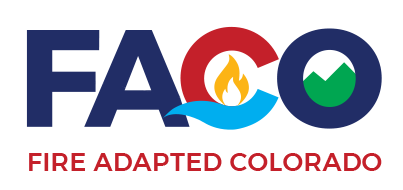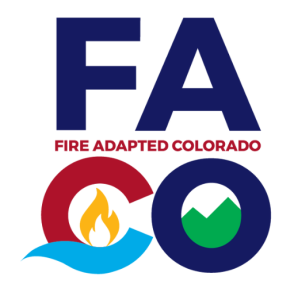Spring Training: FACO’s Wildfire Neighborhood Ambassador Orientation
By: Lisa Hatfield and Lara Thomas
Wouldn’t it be great to have more everyday people encouraging their neighbors to make their properties safer and more resilient to wildfire? How can we effectively convey to more Colorado residents that “mitigation is a lifestyle”?
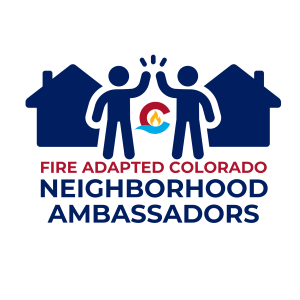
That’s the goal of the Spring 2024 FACO Wildfire Neighborhood Ambassador Orientation for volunteers. The participants are residents of WUI communities across Colorado who know they and their neighbors need to reduce the risk on their private properties and who want up-to-date knowledge and the ability to network.
The new six-class virtual orientation provides education & support for FAC Neighborhood Ambassador volunteers to spearhead wildfire preparedness in their local areas at the manageable level of neighbor-to-neighbor engagement. Although the course is taught by four FACO instructors, throughout the course, volunteers learn how to connect with existing local resources for support, guidance, and coordination.
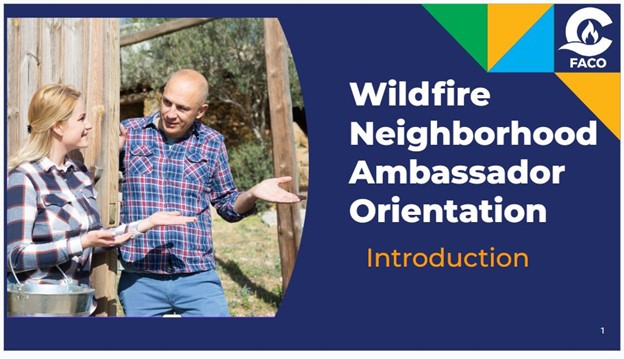
Through the course, the volunteer ambassadors receive multifaceted instruction, everything from fire & mitigation science to managing neighborhood events to the human aspects of encouraging neighbors to take action. After the course concludes, they are assigned to a local coordinator to continue building their programs. They have access to the Neighborhood Ambassadors Coordinators Notebook full of resources & pre-built templates to fast-track their program development, and they have developed a variety of new networking contacts, including other ambassadors throughout their region and the state that are doing similar neighborhood work.
In the past, a fire-adapted communities FAC Neighborhood Ambassador Approach – Fire Adapted Colorado has been a mechanism for professional wildfire risk reduction coordinators to engage with neighborhoods. The goal of working directly with neighborhoods was to help them understand their wildfire risk and encourage the residents to collectively take action to reduce that risk. Those FAC Neighborhood Ambassador Approach Workshops empowered professionals to build their local programs in which residents would assume personal responsibility about wildfire. Through the workshops, the professionals gained access to the Neighborhood Ambassadors Coordinators Toolkit which contained ample resources for program development; resources that can be localized and shared with grassroots-level volunteer leaders.
But we need to engage more residents in more regions of Colorado in this work, and we need to do so urgently. Regional professionals such as wildfire risk reduction coordinators are essential to create sustainable & collaborative local programs that incorporate mitigation best practices. But these coordinators will struggle to meet the local capacity needs for this work without engagement from other regional partners including the investments made by residents serving as Neighborhood Ambassadors through this program.
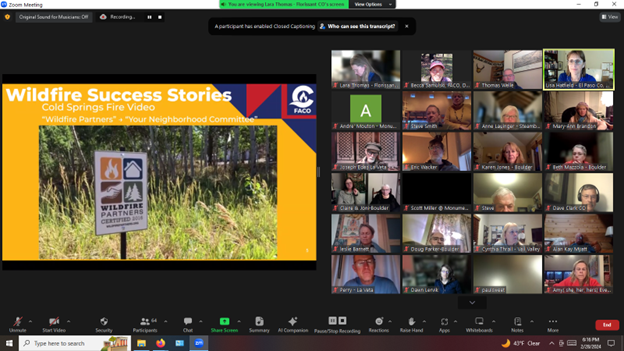
How can regional coordinators synchronize all that energy and enthusiasm coming from private property owners with the mitigation efforts of other regional partners? That’s what the Neighborhood Ambassador Approach is designed to do, and this new online course makes sure the Neighborhood Ambassador resident leaders are well prepared for their vital role.
The twelve-hour online class includes:
- Historical Context of Wildfires
- Getting Organized & Basics of Fire Behavior
- Home Hardening & Home Ignition Zone 1 (Reduce the Chance Your Home Will Burn)
- What is Safe to Plant?
- Colorado Fuels & Vegetation Management in Home Ignition Zone 2 and Zone 3
- Household & Community Readiness
- Planning Community Events and Risk Reduction Workdays
- Human Aspects of Moving Neighbors to Action

In each module this spring, instructors present information and video clips, and participants interact with the subject matter experts and each other via Zoom Chat and Polls. Guest speakers for this pilot course have included FACO participants such as Tom Welle (Assessing Structural Ignition Potential Instructor, West Metro Fire), Chad Julian (CSFS), and Sadie Martinez (DHSEM Access & Functional Needs Coordinator). The course uses Breakout Rooms so that course participants can share ideas with other Neighborhood Ambassadors that are in similar community types or are geographically relevant. Over the summer, participants will organize their own local events and will receive continued program support from their local coordinator and check-ins from FACO instructors as they pursue their programs.
The goal of these summer projects will be to continue building a neighborhood culture around that mentality that ‘mitigation is a lifestyle’. Ambassadors will employ course best practices such as meeting their neighbors where they are, organizing safe & inclusive workdays where people want to come back and participate regularly, and sharing in the success of living in and living the values of a fire adapted community.
